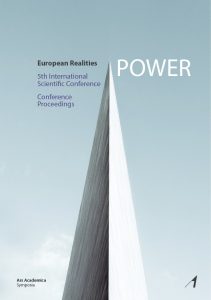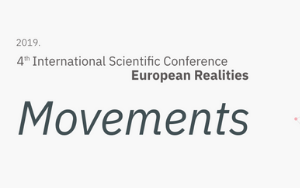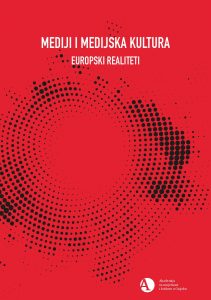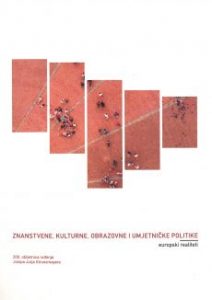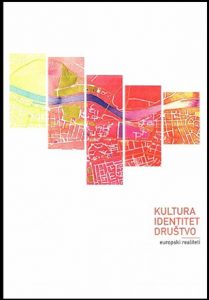Academy of Arts and Culture in Osijek is organizing
5th International Scientific Conference – European Realities
/POWER/
(Osijek, 25th March 2022)
Co-organizer
Croatian Academy of Sciences and Arts, Center for Scientific Work in Vinkovci, Croatia
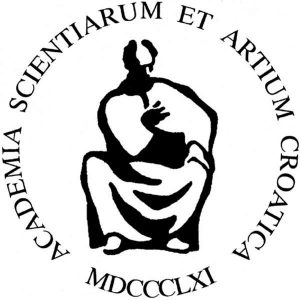
Doctoral School of J. J. Strossmayer University of Osijek

Invitation Letter European Realities – Power 2022
Application form European Realities – Power 2022
Editorial policy European Realities – Power 2022
Paper Guidelines_European Realities – Power 2022
International Scientific Conference European Realities is fifth in continuation science conference in 2013. It is engaged in interdisciplinary research and analysis of cultural, educational, artistic, and scientific policies in the European context and their consequences on specific aspects of the contemporary social and cultural environment. The first conference in 2013 was devoted to the role of national identity in the context of the European Union. The second conference, held in 2015, dealt with the issue of cultural, educational, artistic, and scientific policies in the context of the 200th anniversary of the birth of Josip Juraj Strossmayer. The third conference, which took place in 2017, focused on modern media and media culture. The fourth conference in 2019 was related to the inevitable adaptations of culture, management, creative industries, media, and public communication in the general digital environment.
The umbrella theme of the conference, organized by the Department of Culture, Media, and Management, is POWER. In the broadest sense of the word, power will be viewed as a social phenomenon that implies the possibility of creating or preventing change. Furthermore, adapting depends on a collaborative and flexible approach and an approach that opens up new spaces for collaboration.
Power largely depends on cultural, media, and economic trends. It manifests itself in phenomena such as “Cancel culture,” which gives and deprives individuals of power through social networks and media. To this end, the question arises as to what kind of power movements like «#Me Too» or «Black Lives Matter» question and created. The consequences of the Covid-19 pandemic have affected power distribution in economic, media, scientific, legal, educational, and cultural-artistic aspects. Therefore, it is necessary to encourage the academic community to interdisciplinary reflection on the power problem in our time, to take an analytical approach dealing with power relations in phenomena mentioned above.
The conference questions who and in what way defines, transmits, and creates power and strengthens the synergy between cultural, educational, artistic, and scientific policies and public communications of the modern age, thus enabling the establishment of a stimulating research platform summarized in the fundamental goals of the conference:
- Power and the digital universe – media, educational and social aspects – how digital technology and today’s dominant mass media – such as the Internet and television – define, transmit, and create power. Ubiquitous digital platforms, influencers, digital humanity, artificial intelligence can reposition the existing or create new power relations. Online schooling – highlighted in times of coronavirus crisis – has affected power relations in education systems where perceptions of knowledge are changing. The thematic unit touches on the broadest range of linguistic, racial, national, political, social, class, religious, local, gender, fashion, or any other identities that reflect influence or serve to create some power in contemporary societies.
- Power in the legal, economic, and scientific environment – power implies the possession of material and non-material that affect the ability to create, act and influence the outcome. How do adaptability, innovativeness, knowledge workers, networking, ICT technology, creativity, and other factors, contribute to developing competitiveness and enable the multiplication of power? The new reflections on the relationship between power and identity and the need to find new normative-legal solutions have arisen from crises, e.g., the migrant crisis that has been going on in Europe since 2015 or the current ones caused by the coronavirus.
- Power in cultural and artistic space and production – concerns contemporary art production and its relation to management. Power always mirrored in the creative output reflected beliefs that were already, or will eventually become, socially accepted and even dominant. The question is whether Can we view the action in the field of culture and art outside the activist context and relationship towards (inter)national power – is this possible without the help of management, the market, and its parameters of power?
Some of the topics for discussion within the thematic units of the conference:
- Power and the digital universe – media, educational and social aspects
- Information disorders, information manipulation, hate speech – new regulations and new responsibilities
- Influencer culture and aesthetics – “Cancel” culture, Cyberculture, the idea of the virtual, from stars to selfies
- Cultural representations and the power of media
- Ecstasy of media and communication, digital transformation
- Popular culture in the media
- Protection of media freedom in the digital age
- Artificial intelligence and digital humanity
- Identity – language, gender, media, virtual
- Educational aspects in the digital age
- The public sphere in the digital environment
- Public relations as a text and a profession
- Power in the legal, economic, and scientific environment
- Creative economy: future and development trends
- The impact of unconventional practices and digital marketing
- Projects and partnerships – modeling and financing in the digital age
- Development – formation and adaptation of organizations to a dynamic environment (construction, financing, and management)
- Reputation economy: branding, tourism, entrepreneurship, ICT
- The relationship of economic and political power
- Migration – European aspects, legal regulations, and cultural rights
- European legal framework – information, institution, individual
- Power in cultural and artistic space and production
- Art and creativity as responsibility
- Digital technologies in art production and dissemination
- Technocreativity
- Creative crossroads: cooperation of culture and art with other fields, institutions, and individuals
- Aesthetics of music
- Literature, cultural heritage, cultural consumerism, theatre studies – development potentials
The guidelines mentioned above are not binding. They only point to the diversity of possible perceptions of power as a permanently present social phenomenon. In addition, it seems complicated, for example, to talk about cultural identity or discuss artistic production outside of their digital reflections. In this sense, the 5th International Scientific Conference European Realities – POWER participants are invited to interdisciplinary thinking on the issue of power, and the division into three thematic units is for general guidance only.
Plenary speakers:
Prof. Dr. Joaquin Barriendos
Universidad Andina Simón Bolívar, Quito
Ecuador
Prof. Dr. David Freedberg
Columbia University
SAD
Ivana Nobilo, Ph.D.
Swiss School of Business and Management Geneva,
Switzerland
Organizers/Co-organizers
Academy of Arts and Culture in Osijek, Croatia
Croatian Academy of Sciences and Arts, Center for Scientific Work in Vinkovci, Croatia
Hochschule der Medien, Germany
Politécnico do Porto, Portugal
Univerzita Sv Cyrila a Metoda Trnava, Fakulta masmediálnej komunikácie, Slovakia
Universidad Complutense Madrid, Facultad de Ciencias de la Información, Spain
Swiss School of Business and Management Geneva, Switzerland
University in Mostar, Bosnia and Hercegovina
Organizing Committee
Krešimir Purgar, associate professor
Borko Baraban, assistant professor
Hrvoje Mesić, assistant professor
Marija Šain, assistant professor, president
Marta Borić Cvenić, assistant professor
Damir Šebo, assistant professor
Ana Sladetić, assistant professor of art
Tomislav Dagen, PhD
Igor Gajin, PhD
Darija Kuharić, PhD
Igor Mavrin, PhD
Luka Alebić, PhD
Snježana Barić – Šelmić, PhD
Marina Jambrešić, PhD
Antonija Matić, PhD
Maja Haršanji, MEcon
Marija Tolušić, Ec.S.
Tomislav Levak, MCS
Toni Podmanicki, Ec.S.
Barbara Balen, MCS
Lucija Periš, MA
Tomislav Nedić, LLM
Scientific and Program Committee
Iva Buljubašić (president), assistant professor, Academy of Arts and Culture in Osijek, Croatia
Alen Biskupović, assistant professor, Academy of Arts and Culture in Osijek, Croatia
Vladimir Rismondo, associate professor, Academy of Arts and Culture in Osijek, Croatia
Ivica Šola, associate professor, Academy of Arts and Culture in Osijek, Croatia
Marina Đukić, assistant professor, Academy of Arts and Culture in Osijek, Croatia
Tatjana Ileš, assistant professor, Academy of Arts and Culture in Osijek, Croatia
Prof. dr. Martin Engstler, Hochschule der Medien, Germany
Prof. dr. Uwe Eisenbeis, Hochschule der Medien, Germany
Prof. dr. Burkard Michel, Hochschule der Medien, Germany
Prof. dr. Lars Rinsdorf, Hochschule der Medien, Germany
Mgr. Dáša Franić, PhD., Univerzita Sv Cyrila a Metoda Trnava, Fakulta masmediálnej komunikácie, Slovakia
Assoc. prof. dr. Ján Višňovský, PhD., Univerzita Sv Cyrila a Metoda Trnava, Fakulta masmediálnej komunikácie, Slovakia
Prof. ing. Alena Kusá, PhD., Univerzita Sv Cyrila a Metoda Trnava, Fakulta masmediálnej komunikácie, Slovakia
Mgr. Andrej Brník, PhD., Univerzita Sv Cyrila a Metoda Trnava, Fakulta masmediálnej komunikácie, Slovakia
Prof. Maria Jose Cavadas Gormaz, Universidad Complutense Madrid, Facultad de Ciencias de la Información, Spain
Prof. dr. sc. Miguel Ángel Ortiz Sobrino, Universidad Complutense Madrid, Facultad de Ciencias de la Información, Spain
Prof. dr. sc. Maria Carmen Salgado Santamaría, Universidad Complutense Madrid, Facultad de Ciencias de la Información, Spain
Prof. dr. sc. Mercedes Zamarra López, Universidad Complutense Madrid, Facultad de Ciencias de la Información, Spain
Prof.dr.sc. Jacinto Gomez Lopez, Universidad Complutense Madrid, Facultad de Ciencias de la Información, Spain
Prof. Maria del Mar López Talavera, Universidad Complutense Madrid, Facultad de Ciencias de la Información, Spain
Prof. Andreu Csastellet Homet, Universidad Complutense Madrid, Facultad de Ciencias de la Información, Spain
Prof. dr. sc. Maria Inês Ribeiro Basílio de Pinho, Politécnico do Porto, Portugal
Ivana Bestvina Bukvić, associate professor, Faculty of Economics in Osijek, Croatia
Dario Silić, college professor, PhD, Swiss School of Business and Management Geneva, Switzerland
Zoran Tomić, full professor, University in Mostar, Bosnia and Hercegovina
Sanja Bijakšić, full professor, University in Mostar, Bosnia and Hercegovina
Dragan Čalović, full professor, Megatrend University, Serbia
Partners:
City of Osijek Osijek-Baranja County

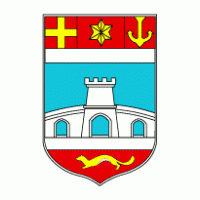
Important dates:
- Abstract submission deadline: extended to February 28th, 2022
- Abstract acceptance notification: February 18th, 2022
- Conference fee payment deadline: March 1st, 2022
- Paper submission and a signed Statement of authorship and originality of the paper: June 30th, 2022, deadline is being extended to September 15th, 2022
- Papers should be sent to: europskirealiteti@gmail.com
Conference Fee
Conference Fee – 750 HRK / 100 € per paper
Conference fee includes taking parts at the Conference, attendance of the events, promotive materials, refreshment during breaks, Conference Proceedings.
The conference fee payment deadline is March 1st, 2022.
Every participant may present one paper at the Conference either as the author or co-author.
Participant without presentation of paper (listening, with certificate) – 300 HRK / 40 €
Payments should be done at the following account:
Akademija za umjetnost i kulturu u Osijeku
P. Svačića 1f, Osijek
IBAN: HR7323600001102689236
OIB:60277424315
Obligatory details to be included:
- purpose of the payment – Conference fee
- participant’s name and OIB
Papers sent after deadlines will neither be reviewed nor published in the Conference Proceedings.
Conference proceedings in English will be submitted for evaluation to databases Web of Science and EBSCO (please note that the selected texts have to meet all requirements related to academic texts in English; the highest quality of professional translation is required).
Application forms should be sent to: europskirealiteti@gmail.com
Contacts:
Marija Šain, assistant professor (marija.sain@aukos.hr)
Barbara Balen, mag. cult. (barbarabalen8@gmail.com)
Marina Jambrešić, PhD (marinacepo@outlook.com)
Conference Secretary:
Marina Jambrešić, PhD (marinacepo@outlook.com)
Official languages: Croatian / English
IMPORTANT INFORMATION:
The Conference is planned to be onsite.
In the case of an unfavorable epidemiological situation, the organizers remain the right to change how the Conference will be held.
In the case of an unfavorable epidemiological situation, the organizers also remain the right to change the date of the Conference.
All participants will be informed about the possible changes. The information will be available on the Conference’s official website.
The deadlines for paper submission and the Conference Proceedings publication will remain the same, regardless of the pandemic situation and possible changes in the Conference’s format and date
Conference proceedings European Realities – Power
Previous conferences and Proceedings
>>> Conference Proceedings International Scientific Conference European Realities – Movements 2019
>>> Conference Proceedings “Mediji i medijska kultura – Europski realiteti” 2017
>>> Conference Proceedings “Kultura, identitet, društvo – Europski realiteti” 2013

